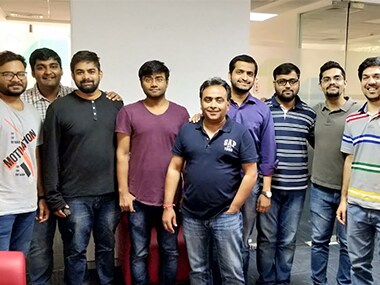Two years after they rolled out Visit, Anurag Prasad, Shashvat Tripathi, Chetan Anand and Vaibhav Singh now count several big names from the technology ecosystem among their investors. The list includes Twitter co-founder Christopher Isaac ‘Biz’ Stone, BlueJeans Network’s co-founder and CTO Alagu Periyanann, Snapdeal’s Kunal Bahl and Rohit Bansal, Qualcomm Ventures India’s former MD Karthee Madasamy, the Murugappa Group’s Muthu Murugappan and MapMyIndia founder Rakesh Verma. But the buzz now is around Biz! Stone, who invested in his ‘personal capacity’ in the Delhi-based healthcare startup, said he believes Visit could solve “a very big and serious problem” in India – “Visit plans to democratise healthcare by shrinking the shortage of doctors using AI… In India, for every doctor there are 2,000 patients lined up in-clinics—waiting for hours. Accessibility to quality health advice is an overwhelming problem in a country with over 200 million people affected by lifestyle problems…” he wrote on Medium. [caption id=“attachment_4442865” align=“alignleft” width=“380”]  From left: Anurag Prasad (2nd), Vaibhav Singh (6th), Chetan Anand (7th), Shashvat Tripathi (9th). Pic courtesy: Visit startup[/caption] Stone decided to bet on Visit before he even met its promoters. Stone heard of Visit from a common friend. “He invested in us without meeting us.” Singh told Firstpost. “We believe that one should reach out to anyone who is a right fit for our model—as mentor, coach or a connection. Funding is secondary, the connection is important. If it happens, good. If it doesn’t, you try again,” said Singh, adding that the co-founders, and college mates, were kicked about the fact that some big names in the industry are backing their idea. The co-founders were never afraid to reach out to big names in the industry and that worked for them, according to Singh, also the spokesperson for the company. Raising funds from Stone, and others, has propelled their startup to a “different orbit”, he added. How does Visit work? Visit was founded in 2016 by the four BITS, Pilani, graduates, with about Rs 45-50 lakh raised from their families. The firm runs an online healthcare service platform that connects users with a pool of doctors to choose from, for consultations. According to Prasad, people tend to neglect health issues until it gets serious, which forces them to visit a specialist. Scheduling follow-up visits are not easy given that doctors’ consultation timings, in most cases, clash with office-timings or rush-hour traffic. Visit, an Artificial Intelligence-powered chatbot, helps in such situations. It begins by noting symptoms; probes users with questions to predict the most probable diagnosis and then connects users with a pan-India network of over 2,000 specialists. Videoconferencing and telephonic consultations follow.Users can follow-up with their doctors for up to seven days. The objective is to assist patients with medication reminders, activity notifications, prescription re-fills, among other things. The bot doesn’t intend to replace doctors. “This is also one of the cornerstones of our model — creating a symbiotic relationship between AI and doctors to create a big impact for patients,” according to a blog-post by Prasad. The aforementioned model attracted Stone. “…Visit facilitates a symbiotic relationship between AI and doctors, making a hugely positive impact for patients…” the Twitter co-founder wrote on Medium. Problem-solving Visit has 16 doctors on its rolls, available 14 hours a day. The platform has also roped in close to 2,000 specialists. For now, the chatbot and livechat are free. Visit’s revenue comes from its 15,000 corporate members. As on date, the platform has catered to 1.5 lakh users, with 60,000-70,000 users coming from Android and the remaining from the web and IoS. Visit handles about 1,500 chat queries a day, regarding general health, medicines, skin problems, diet/nutrition and gynaecology. The average conversation lasts 8.5 minutes and the app is rated 4.7/5 on Google’s Play Store. The platform has handled 200,000 conversations so far. “We talk about how we can solve an issue. Money has never been our motivation or our benchmark. Instead, what we aspire to do is provide the best possible solution that will help a large number of people,” added Singh. Talking about what he’s learnt so far from his work at Visit, Singh was unabashedly honest. “Did you know calorie and kilocalories are the same?” he asked. “I did not know until we started Visit.”
Visit is an online healthcare service platform that connects users with a pool of doctors to choose from, for video/telephonic consultations.
Advertisement
End of Article


)

)
)
)
)
)
)
)
)



